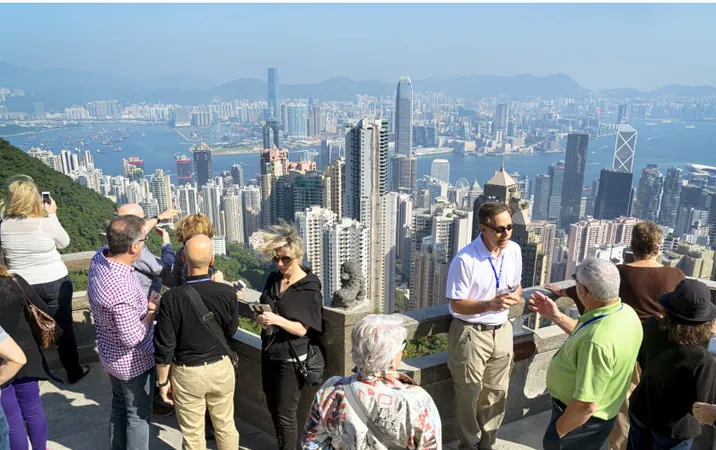
Rediscovering Hong Kong: A Journey from Warnings to Wonders
2024-12-30
Author: Ming
Fifty years ago, I embarked on my first trip from Melbourne to the UK, with an unforgettable overnight stop in Hong Kong. Even then, it was renowned as a “tourist and shopping paradise.” My overwhelmed senses were inundated by bustling crowds, vibrant market stalls, and the intoxicating aroma of street food. Among my treasures from that trip were a brand-new Japanese camera and a portable cassette recorder, which were blissfully affordable compared to their Australian counterparts.
Fast forward to today, and we find an alarming shift. Governments from Washington to Canberra are advising their citizens against traveling to Hong Kong due to newly implemented national security laws. This caution extends to mainland China as well, with warnings painted in equally grim hues. However, it’s worth noting that these laws don’t seem much different from regulations found in the countries issuing these advisories—laws that are arguably less stringent than those applied across many nations globally.
It’s ironic to hear warnings from the U.S., known for its own high crime rates in several urban areas. These travel advisories could be seen as part of a broader strategy by the U.S. to contain China’s rising influence, and the mainstream media often amplifies these sentiments, perpetuating a cautious narrative about life and travel in the region.
Yet, a refreshing counter-narrative is emerging. In the past year, we’ve witnessed a remarkable rise in positive travel content on platforms like social media and video sites focusing on China and Hong Kong. Travelers armed with high-quality smartphones are increasingly sharing their experiences, showcasing the vibrancy and excitement of the region. The stark contrast between their lively narratives and prevailing travel warnings cannot be ignored.
Recent reports highlight the abundant opportunities for eating, shopping, and sightseeing in Hong Kong. Travelers rave about the city's superb public transport system, which is efficient, safe, and budget-friendly. One family captured breathtaking views of Victoria Harbour from their lower-priced hotel, rivaling those of the city's luxury accommodations. Another traveler expressed that staying in Hong Kong felt safer and more pleasurable compared to London.
It's also essential to touch upon the unique pedestrian experience in Hong Kong. While the city has adapted well to the high density of people and vehicles—thanks in part to a network of outdoor lifts and elevated walkways—there remains a notable issue with driver behavior. Many pedestrians encounter the curious threat of vehicles that neglect to use turn signals. This oversight can often lead to frustration and danger, compelling a pedestrian to step onto the street only to be met with an unnecessary honking horn.
Addressing this issue could define a more visitor-friendly experience; a citywide campaign to enhance driver awareness of signal usage would be a welcomed improvement by both residents and tourists.
In stark contrast to the upbeat portrayal of Hong Kong, it’s pivotal to note the valuable role of citizen journalism globally. Just as individual travel stories can revitalize a city’s image, the brave reporting coming from conflict zones, such as Gaza, exposes the stark realities behind powerful government narratives. The ease with which one can disseminate truthful news today counters the throttling grip of misinformation that was once prevalent.
From nostalgic personal journeys to current cultural revelations, Hong Kong remains a beacon of modernity and charm, despite the warnings echoing from afar. As travelers begin to see through the fog of misinformation, it is clear: Hong Kong and its surrounding regions are waiting to be rediscovered. So, why not pack your bags and see for yourself? You might just find a city as captivating as it was fifty years ago.




 Brasil (PT)
Brasil (PT)
 Canada (EN)
Canada (EN)
 Chile (ES)
Chile (ES)
 Česko (CS)
Česko (CS)
 대한민국 (KO)
대한민국 (KO)
 España (ES)
España (ES)
 France (FR)
France (FR)
 Hong Kong (EN)
Hong Kong (EN)
 Italia (IT)
Italia (IT)
 日本 (JA)
日本 (JA)
 Magyarország (HU)
Magyarország (HU)
 Norge (NO)
Norge (NO)
 Polska (PL)
Polska (PL)
 Schweiz (DE)
Schweiz (DE)
 Singapore (EN)
Singapore (EN)
 Sverige (SV)
Sverige (SV)
 Suomi (FI)
Suomi (FI)
 Türkiye (TR)
Türkiye (TR)
 الإمارات العربية المتحدة (AR)
الإمارات العربية المتحدة (AR)